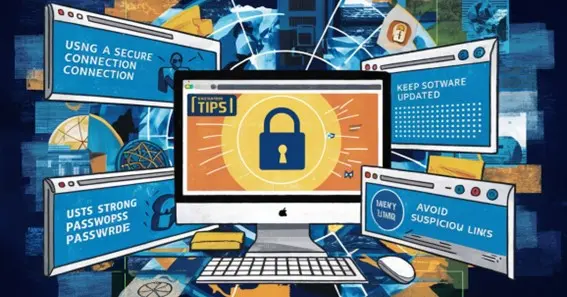In today’s digital age, safe internet browsing is crucial to protect personal information and maintain online privacy. Implementing best practices when browsing the internet can significantly reduce the risk of cyber threats.
1. Keep Your Browser Updated
Regularly updating your web browser ensures you have the latest security features and patches, protecting against known vulnerabilities.
Also Read N: Understanding DCC: Its Role And Meaning At The Independent Living Association
2. Use Strong, Unique Passwords
Create complex passwords for different accounts and change them periodically. Consider using a password manager to keep track of them securely.
Also Read P: Unpacking The Meaning Of Langhorne Slim’s “For The Children”
3. Enable Multi-Factor Authentication (MFA)
MFA adds an extra layer of security by requiring additional verification methods beyond just a password.
4. Be Cautious with Public Wi-Fi
Avoid accessing sensitive information over public Wi-Fi networks, as they are often unsecured and susceptible to eavesdropping.
5. Install and Update Antivirus Software
Reliable antivirus software can detect and prevent malware infections. Ensure it’s regularly updated to recognize new threats.
6. Use Secure Connections (HTTPS)
When browsing, look for “https://” in the website’s URL, indicating a secure connection. This encrypts data transmitted between your browser and the website.
7. Be Wary of Phishing Attempts
Be cautious of unsolicited emails or messages asking for personal information. Verify the sender’s authenticity before clicking on links or downloading attachments.
8. Regularly Clear Browser Cookies and Cache
Clearing cookies and cache can help protect your privacy by removing stored data that websites use to track your online activity
9. Limit Personal Information Sharing
Be mindful of the personal information you share online, especially on social media platforms, to reduce the risk of identity theft.
10. Educate Yourself on Cybersecurity
Stay informed about the latest cybersecurity threats and best practices to enhance your online safety.
By adhering to these best practices when browsing the internet, you can significantly enhance your online security and protect your personal information from potential threats.
FAQ
- Why is it important to update my web browser regularly?
Regular updates provide the latest security patches, protecting against known vulnerabilities. - How does multi-factor authentication enhance security?
MFA requires additional verification methods, making it harder for unauthorized users to access your accounts. - What should I avoid doing on public Wi-Fi networks?
Avoid accessing sensitive information, such as banking details, over public Wi-Fi to prevent potential eavesdropping. - How can I recognize a phishing attempt?
Be cautious of unsolicited messages asking for personal information and verify the sender’s authenticity before engaging. - Why should I clear my browser cookies and cache regularly?
Clearing cookies and cache helps protect your privacy by removing stored data that websites use to track your online activity.
Read a fascinating piece here dcc-meaning-at-the-independent-living-assoc










